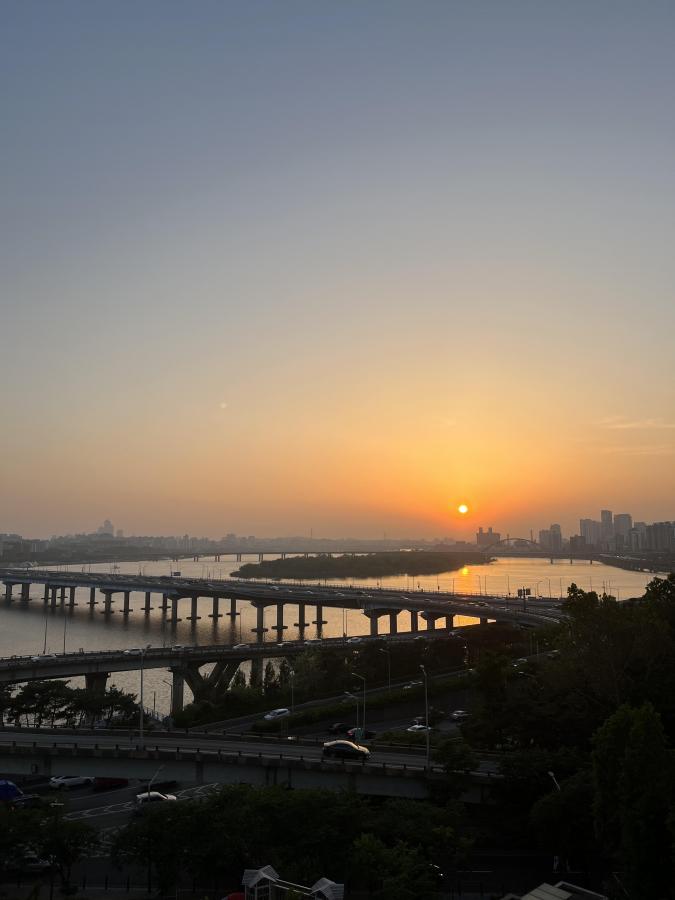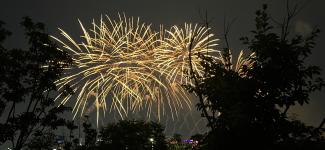Are you a UBC undergrad thinking about going on a student exchange? It can be a daunting decision. You might wonder, what's it like spending a year or a semester in another country? How can you prepare? And how do you handle it when things go sideways? We talked with a group of UBC Global Ambassadors who studied abroad with a Go Global program. They spoke with us candidly, sharing their personal impressions, fears and misgivings, best memories, top tips and advice. (This is story #2 in a series of five Global Exchange Insider interviews.)
Meet Calista Lu, from Vancouver, BC. She is in her 4th year at UBC studying Sociology and Political Science in the Faculty of Arts.
Before you go
Why did you pick Seoul National University? How did you hear about it?
Since high school, I had dreamed of going on exchange. I was always really interested in travelling, yet hadn’t gotten the chance to explore beyond Canada, the United States and family visits to China. I knew as soon as I was eligible, I would make exchange my opportunity to experience travelling and living abroad independently for the first time!
As a second-generation Asian immigrant, I’m drawn to learning about East Asia: the societal differences from the West; the traditions they pass down through families; the history and politics; food and culture. South Korea especially has been at the top of my list due to my love of K-entertainment [South Korean pop culture], which also led me to self-learn some Korean. Spending a few months in Seoul seemed like the perfect opportunity—to not only attend concerts and improve my Korean for personal reasons, but also to pursue my academic goals in a prestigious environment at one of the country’s top universities.
Until the last possible day, I vacillated between my three choices, deliberating in what order to place them. Would Seoul National University (SNU) or Korea University suit me better as my #1 choice? Did I care more about my university’s reputation, location, courses offered or international student population? There were many factors to consider and, in the end, SNU won me over with its impressive academic and professional standing.
The Banpo Bridge Light Show that runs every night in the spring to summer seasons—perfect for picnics with friends by the river (photo: Calista Lu)
What was the application process like? Any tips?
The application to Go Global itself was fairly straightforward in terms of materials required: mainly composing the “statement of interest” and “exchange study plan,” where you research potential courses that you might take at your top three application choices.
How did you prepare? Anything to be aware of? (travel, cultural differences, classes, etc.)
Leading up to actually leaving on exchange, my biggest concern was housing. SNU Gwanak campus offered dorms, but they weren’t guaranteed for exchange students. Though I did apply, I treated dorms as a back-up option without reassurance of hearing back about a placement until mid-February when my flight was to land in Seoul on Feb. 22. Dorms almost entirely offered only shared rooms. I highly preferred sharing a flat with roommates, but having our own bedrooms.
I spent hours and hours house-searching on websites for international students in Korea and scrolling through listings in Facebook groups. I reached out to another Canadian student in one of the Korea-bound exchange student chats and together we combined efforts to find a place—creating a sense of comfort amidst the stress of navigating all things new. After two weeks of exasperating searching, we secured a place with a third flat-mate by early February and were able to breathe a huge sigh of relief.
In addition, I have two tips to highlight:
- I recommend checking your bank before you leave to see if it has an option to switch receiving verification codes by phone number to another method (Whatsapp or email, for example). When you’re using a foreign credit or debit card abroad, a lot of purchases will be flagged as needing verification; that if sent to your phone number, could require a lot of SIM switching back and forth.
- Wise is a great platform to use for transfers across many currencies and at the day’s exchange rate. I relied on Wise heavily to send rent payments, club fees and transfer between friends while I was abroad. Additionally, it’s possible to order a Wise debit card and make payments at the daily exchange rate in-person rather than using a foreign card that charges above the daily rate in fees.

Me in front of the famous Marina Bay Sands in Singapore while visiting my Singaporean friends I met during my summer abroad program in 2022 (photo: Calista Lu)
What worries did you have beforehand? How did you overcome the anxiety?
Entering a new country alone: As I mentioned, I had found another Canadian student to room with for the semester and we were also planning on Airbnb-ing together for the days before we could move into our rental unit. However, I arrived in Seoul two days before she did, which meant that I had to sort out my first experiences in Korea without a friend’s support.
What I ended up doing was planning a very chill first day where I just explored the neighbourhood I was staying in (Myeongdong) and didn’t go further than walking distance from my hotel. I shopped, ate street food and enjoyed busking at my own pace—allowing me to balance adjusting to a new environment while staying within my own comfortable limits. I think it’s important while on your exchange to push yourself to do new things, but also to be aware of your own boundaries, so that you do not feel overwhelmed. Remember that going on exchange is a gradual, long-term learning experience!
I spent the first week before school started just taking in Seoul. My roommate and I explored neighbourhood by neighbourhood, visiting attractions such as Bukchon Hanok Village and Starfield Library among cute cafés, good food and shopping.
Language barriers: I knew not being fluent in Korean would be something I would have to navigate throughout my exchange and I planned to take a Korean course while I was at SNU. Before I arrived, however, I made sure I knew key phrases I thought would come up in ordering food or shopping at markets—everyday type activities—and most importantly, that I had Papago and Google Translate [translator apps] ready for communication.
This is the Haedong Yonggunsa Temple that I visited during a weekend trip to Busan! (photo: Calista Lu)
During the experience
How was the overall experience? What did you learn?
This wasn’t my first experience living overseas. I attended a summer abroad program in Germany previously, meaning I did have an easier time this second time around adjusting to a new country. However, living in Korea did challenge me to live even more independently: from searching for my own housing, setting up my SIM plan, paying rent monthly to my landlord-agent and opening a bank account abroad to managing my finances between my Canadian and Korean accounts.
I’m the type of traveller who aims to take every possible opportunity, living by the motto “you never know when you’ll get this chance again.” So almost every week I had a day trip or weekend trip in Korea planned: hitting Gapyeong, Gangneung, Sokcho, Busan and Daegu. I went to eight music festivals and concerts, as well as a smattering of university festivals where along with having student games, events and performances, the university invited popular Korean artists to perform with typically no cost for attendees. When not actively travelling out of Seoul, my friends and I had a lot of fun just hanging out at the Han River, café-hopping, going to karaoke or just enjoying the nightlife. Through SNU’s Buddy club which matched exchange students with Korean students, I could enjoy planned excursions to Gyeongbukgong Palace, student pub nights and Taekwondo workshops, as well as an overnight retreat.
Small things in my every-day life will remind me about living in Korea, and I will feel simultaneously so fulfilled that I got to live life to the fullest, but also wistful that this period is in the past."
If you could change something or do it differently, what would you change or do?
I would say that, perhaps in another life if I could choose my university again, I might have chosen a different Korean school with more courses in my specialization areas. This is because now back at UBC, I only have major and minor credits remaining and am left with an intense workload versus if I had attended another university and could have taken additional courses in sociology or political science in English. Overall, though, I don’t regret my choices because every choice I made led to the memories I formed and people I met.

The view while studying from a nine-floor book café in the Mapo-gu of Seoul near the Han River (photo: Calista Lu)
How were the academics?
In terms of classes, I purposely took only three courses that I stacked on Monday and Thursday. When choosing my courses in February, I could guess what my courses would transfer over as: one minor requirement and two elective credits. I also considered that I was still taking part in two extracurriculars back at UBC that would continue til April and from May on, and that I would be on a co-op search term in 2023. I found that for my two non-language classes, the teaching style and work distribution were relatively like UBC classes. This makes sense considering my two professors were both American, teaching one of SNU’s limited courses in English.
How was the social aspect?
There were countless memories over my five months abroad that I would consider my favourites. One highlight was visiting Everland amusement park in June. I was with a great group of SNU students, close friends and new faces, the weather was wonderful and the atmosphere really was magical. I went on the world’s tallest, and Asia’s fastest, wooden roller coaster, T-express, which to this day is the scariest ride I’ve ever been on, but which also made it a core memory for me. Another highlight would be Day 2 of my Busan trip. Since I had left Vancouver, Busan was the first city in Korea I visited along the sea and the views were so so beautiful. I fell in love with the city’s beaches, nature, seafood and overall atmosphere. I was even lucky enough to visit a café where the owner was from White Rock, BC and it was a heartwarming reminder of home even thousands of kilometres away.

My friends and I on the 40-minute walk up Namsan Mountain to the Namsan Tower during cherry blossom season (photo: Calista Lu)
After the experience
Would you recommend this experience to others? What can they look forward to?
I absolutely would recommend exchange to other students. My time abroad really was one of the best periods of my life. Small things in my every-day life will remind me about living in Korea, and I will feel simultaneously so fulfilled that I got to live life to the fullest, but also wistful that this period is in the past.
What was the impact on your academic and personal development?
Exchange enabled me to work on my Korean, integrate into a new university and culture, and meet a network of wonderful, wonderful people that I hope to reunite with across the world.

At the Wat Pho temple in Bangkok—I visited following my exchange semester (photo: Calista Lu)
Read more Go Global student stories.
